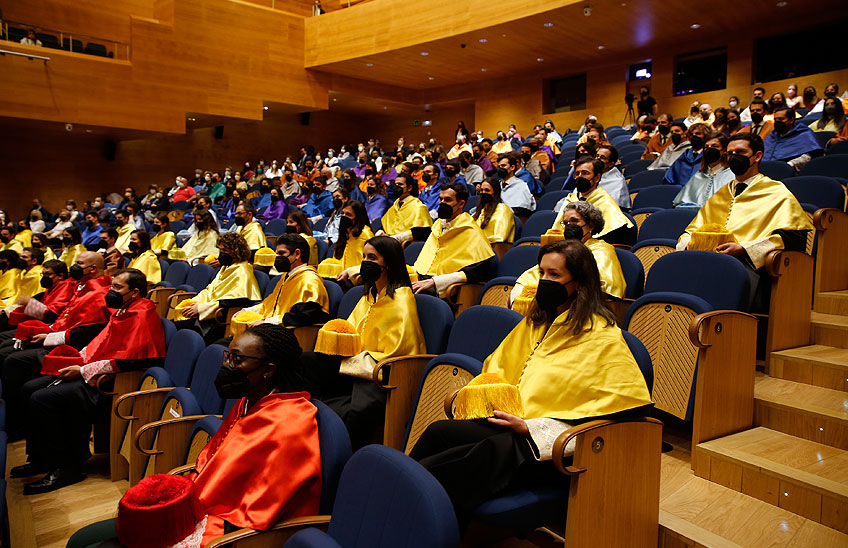The University celebrates the investiture of 319 PhDs from 26 countries
"It has fallen to you to finish your theses in the midst of a pandemic. You have been courageous and tenacious; you have not listened to the discouraging messages or the siren calls," says the rector.

FotoManuelCastells/The University of Navarra celebrated this afternoon the investiture ceremony, which was attended by some of the 319 PhDs who have defended their theses in the last two years.
04 | 06 | 2021
A total of 319 PhDs, belonging to 16 faculties and schools of the University of Navarra, have defended their theses during the 2019-20 and 2020-21 academic years. The investiture of new doctors was held at the Museum of the academic center. For the first time, it has been a joint act of two promotions, since due to the health situation last year it could not take place.
Despite the pandemic, more than 300 theses were defended by doctors from 26 countries: Argentina, Belgium, Bolivia, Brazil, Bulgaria, Cameroon, Canada, Czech Republic, Chile, Colombia, Ecuador, El Salvador, Spain, USA, Honduras, India, Italy, Kenya, Mexico, Nigeria, Pakistan, Paraguay, Peru, Poland, Uganda and Venezuela.
"It has fallen to you to finish your theses in the midst of a pandemic. But you have been brave and tenacious. You have listened to neither discouraging messages nor siren songs. You have completed your work under the most difficult conditions," acknowledged the rector, Alfonso Sánchez-Tabernero.
"Today we celebrate an inheritance," he said at the beginning of his speech. "The new doctors trained at the University of Navarra have taken up the baton in a long-distance race: you are already the protagonists of an exciting adventure. You are the heirs of the men and women who decided to work for a world in which knowledge would be at the service of all. Because that is the only driving force that gives full meaning to research: its positive impact on the lives of many people.
"At the University of Navarra," he added, "we have configured a truly humanistic institution, which seeks to illuminate every corner of knowledge in order to place it at the service of others," he stressed. This, in an almost literal sense according to Professor Sánchez-Tabernero, was what Francisco Ponz, the third rector of the University, who died last December, did. He emphasized his dedication to study, his humility and his status as a teacher.
Regarding humility, he recalled how he used to advise his students to flee from individualistic competitiveness, an "almost revolutionary" statement in the contemporary world, the rector assured. "He was well aware that science almost never comes from the brilliant idea of genius but is usually the fruit of teamwork. He knew that ivory towers are a drag on knowledge."
Research to confront a global tragedy
Ramón Salaverría, professor of the School of Communication and sponsor of the graduating class, said that "today seemed improbable. More than one, in moments of anxiety, would have even considered it impossible. This auditorium, he pointed out, is today a monument to sacrifice and renunciation: "You have all made an effort that only you, and your most beloved people, know how far it will go".
"Getting a doctorate has never been an easy task. It is a path that demands singular effort, conviction and discipline. A long, solitary itinerary, with numerous steep slopes and not a few precipices," said the professor. "However, rarely has the goal been as remote and unreachable as on this occasion," he added.
In his opinion, this time has revealed to us that research activity "is transitory, transitive and, above all, transcendent. Rarely has this finalistic character of science been so evident as it has been throughout these uncertain times in which we live. The world has needed researchers to face a global tragedy. Each one of you, in your own discipline, has managed to find the way out".
Javier Sáez Gastearena, who spoke on behalf of his colleagues, referred to the value that over the last year has often become "the cornerstone" of the work of new doctors. "The courage to keep one's sanity and resist the temptation to get carried away. Of not seeing anything, but continuing to fight and move forward; successfully or not," he stressed.
The researcher thanked the role of the people and institutions that have participated in his training, among them the University, his thesis directors and especially his family and friends "for always persevering and for their unconditional affection, for their trust, understanding and encouragement".
The theses defended in the 2019-20 and 2020-21 academic year have been made possible thanks to the contribution of institutions such as the Association of Friends of the University of Navarra, La Caixa Foundation, Caja Navarra Foundation and Banco Santander.
